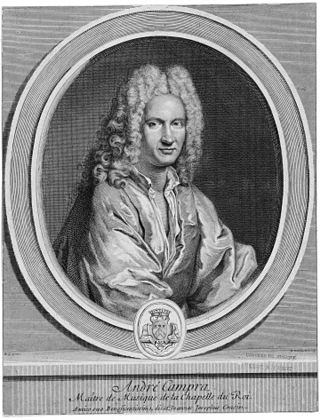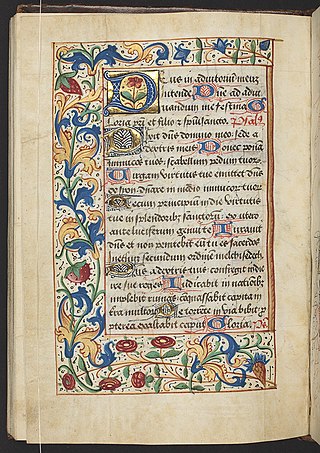
Gregorio Allegri was a Catholic priest and Italian composer of the Roman School and brother of Domenico Allegri; he was also a singer. He was born and died in Rome. He is chiefly known for his Miserere for two choirs.

Paolo Agostino was an Italian composer and organist of the early Baroque era. He was born perhaps at Vallerano, near Viterbo. He studied under Giovanni Bernardino Nanino, according to the dedication in the third and fourth books of his masses. Subsequently, he married Nanino's daughter.

André Campra was a French composer and conductor of the Baroque era. The leading French opera composer in the period between Jean-Baptiste Lully and Jean-Philippe Rameau, Campra wrote several tragédies en musique and opéra-ballets that were extremely well received. He also wrote three books of cantatas as well as religious music, including a requiem.

Giovanni Maria Nanino was an Italian composer and teacher of the late Renaissance. He was a member of the Roman School of composers, and was the most influential music teacher in Rome in the late 16th century. He was the older brother of composer Giovanni Bernardino Nanino.
Giovanni Bernardino Nanino was an Italian composer, teacher and singing master of the late Renaissance and early Baroque eras, and a leading member of the Roman School of composers. He was the younger brother of the somewhat more influential composer Giovanni Maria Nanino.

Psalm 126 is the 126th psalm of the Book of Psalms, beginning in English in the King James Version: "When the Lord turned again the captivity of Zion, we were like them that dream". In Latin, it is known as In convertendo Dominus. It is one of the fifteen Songs of Ascent in the Book of Psalms whose opening words in Hebrew are "Shir HaMaalot". In the slightly different numbering system used in the Greek Septuagint version of the Bible and in the Latin Vulgate, this psalm is Psalm 125.

Psalm 93 is the 93rd psalm of the Book of Psalms, beginning in English in the King James Version: "The LORD reigneth, he is clothed with majesty". The Latin wording is Dominus regnavit, decorem indutus est. The Book of Psalms is part of the Hebrew Bible and the Christian Old Testament. In the slightly different numbering system of the Greek Septuagint and Latin Vulgate versions of the Bible, this psalm is Psalm 92. It is the first of a series of psalms which are called royal psalms as they praise God as King.

Psalm 134 is the 134th psalm from the Book of Psalms, a part of the Hebrew Bible and the Christian Old Testament, beginning in English in the King James Version: "Behold, bless ye the LORD, all ye servants of the LORD". Its Latin title is "Ecce nunc benedicite Dominum". It is the last of the fifteen Songs of Ascents, and one of the three Songs of Ascents consisting of only three verses. The New King James Version entitles this psalm "Praising the Lord in His House at Night".

Psalm 133 is the 133rd psalm of the Book of Psalms, beginning in English in the King James Version: "Behold, how good and how pleasant it is for brethren to dwell together in unity". In Latin, it is known as "Ecce quam bonum". The psalm is one of the fifteen Songs of Ascents, and one of the three Songs of Ascents consisting of only three verses.

Psalm 46 is the 46th psalm of the Book of Psalms, beginning in English in the King James Version: "God is our refuge and strength, a very present help in trouble". In the slightly different numbering system used in the Greek Septuagint and Latin Vulgate translations of the Bible, this psalm is Psalm 45. In Latin, it is known as "Deus noster refugium et virtus". The song is attributed to the sons of Korah.

Psalm 48 is the 48th psalm of the Book of Psalms, beginning in English in the King James Version: "Great is the LORD, and greatly to be praised in the city of our God". In the slightly different numbering system used in the Greek Septuagint version of the bible, and generally in its Latin translations, this psalm is Psalm 47. In the Vulgate, it begins "Magnus Dominus". The psalm was composed by the sons of Korah, as "a celebration of the security of Zion", In its heading it is referred to as both a "song" and a "psalm".

Psalm 96 is the 96th psalm of the Book of Psalms, a hymn. The first verse of the psalm calls to praise in singing, in English in the King James Version: "O sing a new song unto the Lord". Similar to Psalm 98 and Psalm 149, the psalm calls to praise God in music and dance, because he has chosen his people and helped them to victory. It is one of the royal psalms praising God as the King of His people.

Psalm 97 is the 97th psalm of the Book of Psalms, beginning in the English of the King James Version: "The Lord reigneth; let the earth rejoice", also as "The Lord is King". The Book of Psalms is part of the third section of the Hebrew Bible, and a book of the Christian Old Testament. In Latin, it is known as "Dominus regnavit exultet terra". The psalm is a hymn psalm; the Jerusalem Bible calls it an "eschatological hymn".

Psalm 99 is the 99th psalm of the Book of Psalms, beginning in English in the King James Version: "The LORD reigneth; let the people tremble". The Book of Psalms starts the third section of the Hebrew Bible, and, as such, is a book of the Christian Old Testament. In the slightly different numbering system in the Greek Septuagint version of the Bible, and in the Latin Vulgate, this psalm is Psalm 98, beginning "Dominus regnavit". It is the last of the set of additional Royal Psalms, Psalms 93-99, praising God as the King of His people. There is no title in the Masoretic text version, but the Septuagint provides a title: "A psalm of David".

Psalm 110 is the 110th psalm of the Book of Psalms, beginning in English in the King James Version: "The LORD said unto my Lord". In the slightly different numbering system used in the Greek Septuagint and Latin Vulgate translations of the Bible, this psalm is Psalm 109. In Latin, it is known as Dixit Dominus. It is considered both a royal psalm and a messianic psalm. C. S. Rodd associates it with the king's coronation.

Psalm 127 is the 127th psalm of the Book of Psalms, beginning in English in the King James Version: "Except the Lord build the house". In Latin, it is known by the incipit of its first 2 words, "Nisi Dominus". It is one of 15 "Songs of Ascents" and the only one among them attributed to Solomon rather than David.
In convertendo Dominus, Op. 32, is the musical setting of In convertendo Dominus, written by Jules Van Nuffel in 1926 for a mixed choir and organ.

In convertendo Dominus, sometimes referred to as In convertendo, is a setting by Jean-Philippe Rameau of In convertendo Dominus, the Latin version of Psalm 126,. It is listed as RCT 14 in the Rameau Catalogue Thématique of Sylvie Bouissou and Denis Herlin.

Tre Motetter, FS 139, Op. 55, is a composition for unaccompanied choir by Carl Nielsen. It is a setting of three quotations in Latin from different psalms chosen by the composer and his wife Anne Marie Carl-Nielsen. The three motets, Afflictus sum, Dominus regit me and Benedictus Dominus were first performed on 11 April 1930 at the Ny Carlsberg Glyptotek by Mogens Wöldike and the Palestrina choir, to whom they are dedicated. Among the composer's last works, they were published in 1931 by the Skandinavisk Musikforlag in Copenhagen.

Laetatus sum, Op. 45, is a musical setting of Psalm 122 in Latin by Jules Van Nuffel, composed in 1935 for mixed choir and organ.

















